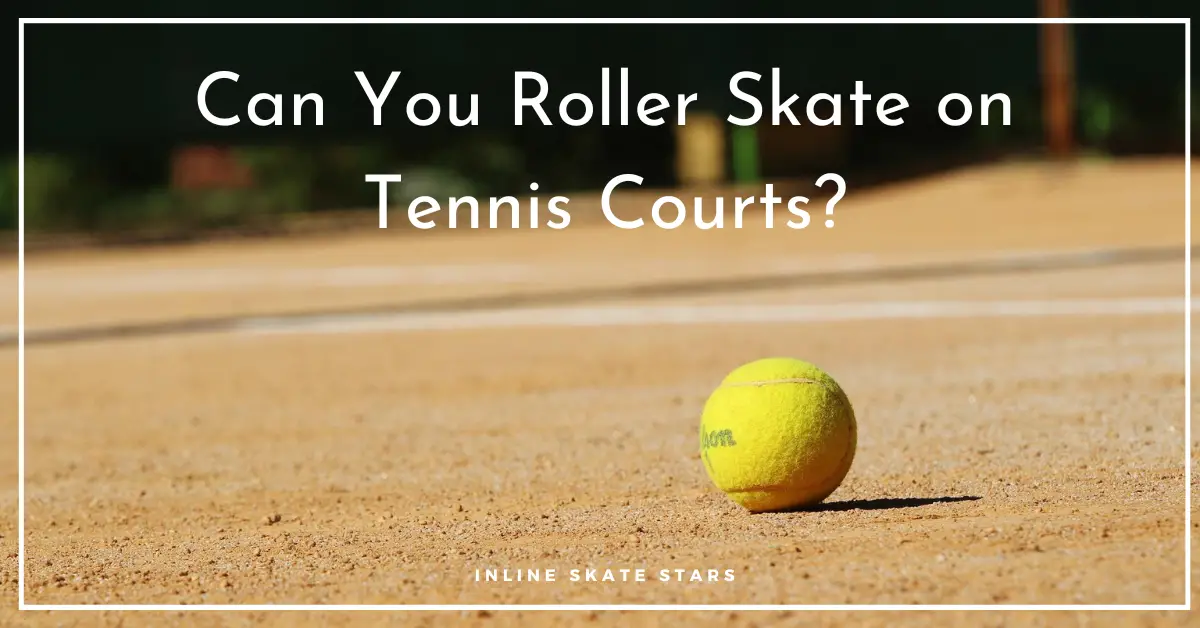Can you roller skate on tennis courts?
Roller skating is fun since you have plenty of surfaces for roller skating, including tennis courts. Roller skating is also a social hobby.
You can make new friends every time you go skating since you meet new people every day. It’s a great way to build social capital.
Tennis courts are among the best roller skating options. They’re often leveled and smooth without debris, making them safe for beginners, intermediate, and pro skaters.
Importantly, roller skating at a tennis court keeps skaters away from the danger of being hit by cars. This is especially when you roller skate on the roads. Roller skating can be dangerous, so safety is crucial.
The benefits of roller skating on tennis courts are plenty, but it doesn’t mean you can roller skate on any tennis court.
I got your back if you’re wondering whether you can roller skate on tennis courts. This guide covers everything about roller skating on tennis courts. So, let’s get to it!
Can You Roller Skate on Tennis Courts?
First things first!
Can you roller skate on tennis courts? You can roller skate on most tennis court surfaces like concrete and asphalt. But roller skating on an acrylic-coated tennis court isn’t a good idea since roller skates can scuff, mar, scratch, and damage the special acrylic-coated surface.
Installing and maintaining acrylic-coated tennis courts can be pretty expensive. Any damages on the special coated surface add to the maintenance cost, which can be pretty expensive.
Roller skating on acrylic-coated tennis courts is forbidden. But this doesn’t mean you can’t roller skate on other tennis court surfaces.
The common tennis court surfaces are wood laminate flooring, carpet, synthetic grass, concrete, asphalt, and natural surfaces.
Wood laminate, concrete, and asphalt surfaced tennis courts are okay for roller skating, especially when the court management allows it.
How to Roller Skate on Tennis Courts
While you can roller skate on some tennis courts, it’s forbidden to roller skate on acrylic-coated tennis courts since they’re delicate and susceptible to abrasion damages.
So, as a rule of thumb, you should ask court management and tennis players if they can allow you to use the court. This is a great way to avoid unnecessary conflicts!
Below are cool tips on how to roller skate on tennis courts!
1. Ask for Permission from Court Management and Tennis Players
Courtesy always pays, so it’s worth asking permission from tennis court management and players if you can use the court for roller skating.
Often, they’ll be inclined to allow you to use the court, especially if it’s concrete or asphalt and it’s not in use. This is why you should ask first, instead of assuming it.
This way, you will avoid unnecessary conflicts with the players and management.
Sometimes you don’t have to ask since you’ll find a warning notice erected at the entrance forbidding roller skating on the tennis court. You’ll save yourself the effort and find alternative roller skating venues.
Most tennis courts forbid skateboards, inline skates or roller blades, bikes, and scooters on their premise.
The reasons are simple! They don’t want the surface to be damaged. They also don’t want interference while doing their thing.
Importantly, you want to abide by the court management rules if allowed to roller skate on the tennis court. This way, you won’t be kicked out, giving you more time to enjoy roller skating.
2. Use Soft-wheeled Roller Skates
Tennis court surfaces, especially acrylic-coated tennis courts, can be pretty expensive. The last thing you want to do is damage the surface with your roller skates.
It’s best to roller skate responsibly if allowed to use the court. This starts by wearing proper roller skate shoes for tennis courts. The recommended roller skates have soft wheels, which are gentle on the surface.
The best part is that soft wheels offer more traction. This is best for beginner and intermediate roller skaters looking to roller skate outdoors.
The durometer scale determines roller skates wheel hardness. Soft wheel roller skates have a durometer of between 74A to 105A. You can opt for any wheel whose durometer falls within this range.
If you aren’t sure, you can always ask the shop attendant if you are shopping from your local skate shop. The same applies when shopping online.
Below are some of the best roller skates recommended for tennis courts. Feel free to check them out on Amazon!
- Riedell Skates – Crew – Outdoor Quad Roller Skate
- Jackson Vista Viper Nylon Outdoor Skate
- Rollerface HipSkates White, Women’s Outdoor Roller Skates
- Rollerface Hipskates Soul, Outdoor Roller Skates
- Jackson Finesse Lilac Outdoor Skate
3. Only Roller Skate on Asphalt, Concrete, synthetic grass, and Wood Laminate Surfaces
Roller skate wheels can be rough on some tennis court surfaces, especially acrylic-coated tennis courts. These surface types are expensive to install and maintain.
You don’t want to be the one making it hard for court management and players. The best way to avoid this is to only skate on Asphalt, Concrete, synthetic grass, and Wood Laminate Surfaces.
These surfaces are often sturdier and less susceptible to abrasion damages. This is why they’re the best if you must roller skate on tennis courts.
4. Build Rapport with Tennis Players
Asking for permission from players to use the court for roller skating isn’t enough. At least, you should try to build a relationship, however casual.
This way, the players will feel valued and appreciated. It’s the best way to earn yourself more days and hours to use their tennis court.
5. Minimize or Avoid Some Roller Skating Tricks
Roller skating tricks are cool and fun to do. Nearly every roller skater looks to a time when they can perform roller skating tricks.
But some roller skating tricks aren’t friendly on delicate acrylic surfaces. Spins and tricky jumps are perfect examples, and they can damage these surfaces.
Depending on the surface type, you should minimize or avoid performing these tricks to prevent damaging the tennis court surfaces.
Can You Roller Skate on Tennis Courts? FAQs
1. Can you roller blade on a tennis court?
You can roller blade on a tennis court since they’re often leveled, smooth, and free of pebbles, soil, and twigs, making them safe. They’re safe since you don’t have to conflict with cars.
2. Can you roller skate on any surface?
You can’t roller skate on any surface, especially rough and slippery ones. The best surfaces for roller skating are wood, rubber, polyurethane, vinyl, concrete, and asphalt.
You’ll find these surfaces on roads, pavements, driveways, car parking lots, bike lanes, roller skating rinks, and skate parks.
3. Can you skate with roller skates outside?
Yes, you can skate with roller skates outside if you have roller skates for outdoor use. Alternatively, you can buy roller skate wheels for outdoor use, then change your wheels whenever going to roller skate outside.
Can You Roller Skate on Tennis Courts? Wrapping Up
You can roller skate on tennis courts if the management and tennis players allow you. But, roller skating on specific tennis court surfaces with an acrylic coating isn’t a good idea since it can damage the surface.
These surfaces are expensive to install and maintain. So, it’s best to avoid frustrating the court management.
Tennis courts are safe for roller skating. You can use concrete, and asphalt surfaced tennis courts if you must roller skate at a tennis court.
That’s it! I hope you found this guide helpful!




